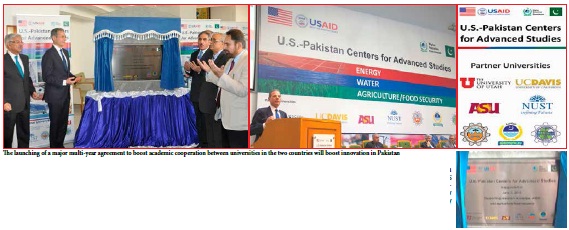US-Pakistan Centers for Advanced Studies Launched
By Ras H. Siddiqui

“US Under Secretary of State for Public Affairs and Public Diplomacy Richard Stengel and US Ambassador to Pakistan Richard G. Olson, along with Minister for Water and Power Khawaja Muhammad Asif, officially launched the US-Pakistan Centers for Advanced Studies (CAS), a $127 million investment from the United States building partnerships in higher education and research, at the National University of Science and Technology (NUST). More than 300 students, faculty, and administrators attended the event,” says a press release
issued by the Embassy of the United States in Islamabad, Pakistan.
US-Pakistan relations have not been predictable in recent years but there is a silver lining if one cares to look deeper than some media-driven negatives. Over several decades the relationship between the two countries has certainly been led by the military-security angle; whether it was the joint fight against totalitarianism of the past to the battle against fanatical extremism of the present. But the quiet work of academics, bureaucrats, other well-meaning individuals and groups has not often made it to the headlines, and it is time to change that. Here we have one fruit of their joint effort, one which can only be described extremely positive news for friends of both countries and a good reason for the celebrations recently held in both the United States and in Pakistan. The launching of this major multi-year agreement to boost academic cooperation between universities in the two countries will boost innovation in Pakistan and enhance people-to-people contacts.
Quoting further from the same Embassy press release, “Both the National University of Sciences and Technology (NUST) and the University of Engineering and Technology, Peshawar will partner with Arizona State University to create two centers for energy research; the University of Jamshoro and University of Utah will partner to create the center for water; and the University of Agriculture Faisalabad and the University of California at Davis will partner to create the center for agriculture and food security.” The United States, according to the press release, "will provide graduate-level scholarships through exchange programs and support construction of world-class libraries, laboratories, and additional research facilities. Since 2009, the United States Government has built or rehabilitated about 1,000 Pakistani schools, provided over 5,000 scholarships for Pakistani students to study English and awarded scholarships to more than 12,000 Pakistani students to study at Pakistani higher education institutions through various USAID educational programs. The United States also currently supports nineteen partnerships between Pakistani and US-based universities.”
According to a USAID press release on the same topic dated June 4, 2015, “This initiative is a set of partnerships between world-class US and Pakistani universities that will harness applied research to find innovative and practical solutions for Pakistan’s energy, water, agriculture, and food security challenges.” And through more details made available from USAID, “Key components of the US Pakistan Centers for Advanced Studies Program include developing: new disciplines, Pakistan centric, industry specific courses, provision of scholarships to students and students and faculty exchange programs.”
A $127 million investment is no small potatoes. Pakistan is currently an energy-starved country which has always remained short on petroleum-based fuels amidst growing consumption. And the next big crisis it will have to face is water shortages, not only for personal consumption but for its agriculture-based economy. And to tie all these elements together, food security has to come to mind as the population approaches 200 million. That is where USAID and similar organizations come in. They are there to help Pakistan address these issues (amongst others) which are not just concerns for the future but are already being faced today.
US-Pakistan cooperation in agriculture has helped increase both food security and quality of output in the Indus region. One “Joint Venture” fruit which is the pride of Pakistan today was developed at a University of California campus. Many Pakistanis are still not aware of its origins, but it is known to them as the Kinnow! Just this one success is proof of the “fruits” of continued cooperation between the area that became Pakistan and the United States. And there should be no doubt that this relationship should continue. We welcome this news about the US-Pakistan Centers for Advanced Studies and the benefits that they will bring to Pakistanis.
-----------------------------------------------------------------------------

